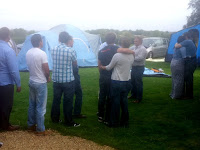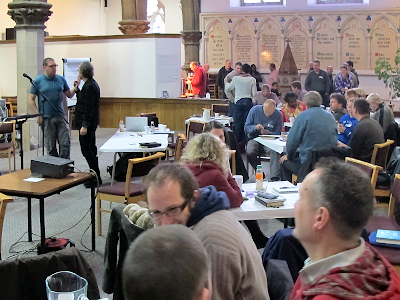< 13th September 2011 |
Index |
16th September 2011 >A series of three addresses at Moggerhanger in Bedfordshire brought together Clifford Hill, Wolfgang Simson, and Peter Farmer to share their thoughts on the current state of Britain.We gathered in the evening on 14th September for soup, a welcome and an introduction to the
Moggerhanger meetings.
Introduction - On 15th we began with some introductory thoughts from Danny Stupple. The intention was a day of consultation with Jesus and a sense that we would need to come like little children in open simplicity. Some other phrases that seemed important were 'body ministry', 'running with our eyes fixed on Jesus' and 'it's not about the steps we take, it's about the ultimate destination'.
 Body ministry
Body ministry - With that in mind here are some things that came out of an initial time of open contribution.
1 Corinthians 14:26 (body ministry) and
Psalm 98 (sing and rejoice) were mentioned.
Wolf Simson mentioned Abraham and Isaac and asked, 'What is
our sacrifice? What is our Isaac?' I shared a word from the Lord, 'I AM. That is my name just as I told Moses. It is not your place to say, "I am" - it is
my place to say "I AM" -
my place and mine alone. I say "I AM" and it's for you to say, "You are"'.
Then there was a tongue and an interpretation. 'Finish the work, talk about how you will finish the work'. He has a plan for the end, a finished work - but it has to be worked out in practice. The river and the trees in
Revelation 22 are for the healing of the nations (see also
Ezekiel 47:1-12). There will be a crumbling of the existing order, a shaking as in
Hebrews 12:26.
Further thoughts included
Isaiah 48:14, the redeemer, peace like a river, righteousness, the river again, and leaving Babylon.
Isaac and the knife is about our reputation.
Clifford Hill - We heard about the history of British society leading to the current disaffection and deprivation and lack of hope. This was a valuable background for the ideas that would be set out by the next two speakers.
After sharing his own story of life and work in Brixton Clifford explained that his generation had the responsibility of helping us understand the present. He covered the history of slavery in the West Indies and the harsh conditions in the north of England during the same period (tantamount to white slavery) and outlined how this affects the first, second and third generations thereafter.
During the recent Tottenham riots there was no racial tension, instead the trouble was caused by the third generation of both groups who find themselves pressed into the same mould of dysfuntional family life. When families break down, so does the nation. There's a deep need for good fathers.
The Old Testament has little about fatherhood until
Isaiah 63 and 64. Clifford stressed that we're not to be building our own houses, but should focus on the
Lord's house. We must recognise our sinfulness (
Isaiah 64:6) and repent. And in
John 15 we finally see that the Father's heart is truly our heritage.
Wolfgang Simson - Wolf noted that Britain is getting worse, every time he visits he sees deterioration. He spoke about the father of the Prodigal Son, in some ways it is not a good example of fatherhood. One son sees him as an employer, the other feels neglected. The father is like the church.
He pointed out that a crisis causes us to ask questions and only then will we be able to find answers. But we make progress by obeying the King and we desperately need to put that into practice. There's a difference between prophets (who point to the mountain) and apostles (who build a road to get there).
1 Corinthians 4 shows us the role of an apostle. Often an apostle is unrespected, comes out of nowhere and may appear foolish.
We have to go back to the first true radical - Jesus! We must repent and have the attitude, 'Your Kingdom come, my kingdom go'. We don't need a church religious system, we need the Kingdom, the domain of the Almighty's uncontested rule, our opinion is not invited.
The role of parents is to provide a phone number, a cheque book, and love. That's what the older generation is for - support; it's true in family life and it's a Kingdom truth too. Apostles and prophets set up a home.
It's time to stop merely preaching the Kingdom and to begin living it as Jesus intended. Father's initiative is to open up his house; we should do the same.
Wolfgang Simson set out for us the Kingdom perspective on the state of Britain in 2011. All is not lost, there is a roadmap out of this mess but we had better start paying attention to the King and begin doing what he says, not following our own ideas.
Peter Farmer - Right at the start, Peter shared that his wife, Marsha, is a cousin of Mark Duggan who was shot by police in Tottenham. Peter and Marsha have been working in the Meadows area of Nottingham for about eleven years and there is a clear sense of oppression amongst the people there. Peter described how the work they were doing was not accepted by traditional church leaders.
This follows the same pattern of trouble faced by people like William Booth, John Wesley, and groups like the Lollards. They brought transformation but faced severe difficulties. Paul had similar difficulties two thousand years ago.
Peter suggested there are two kinds of soil in the UK today. On the one hand there are those who grow well until difficulties come, but then they back off and the new growth withers. On the other hand others are distracted by the things of this world, things 'get in the way'. The answer to the first group is 'blessed are you when you are persecuted' and the answer to the second group is 'woe to the rich'.
Trouble and persecution are coming, the question is will we respond now or will we leave it until later? Of the prophets, Peter commented that there is no such thing as an unpersecuted prophet. Jesus himself said, 'Some you will stone and some you will kill'. They said things that stirred people up; we are not called to be comfortable.
Peter wondered how we are to train people to hear for themselves? How do we train people to read and understand the Bible for themselves? He believes the Lord will use us as spiritual mothers and fathers. We must bring the poor and the hurt into our homes. They will respond out of brokenness so it certainly won't be easy! We need to find (and follow) Kingdom principles of education, politics, and life. Projects that follow these priciples to work on the solutions will be loud and chaotic. Will we celebrate this work or persecute it?
Traditional church in the UK is prejudiced against the working class, we need to do more than give them soup and let them continue in distress. We need to release them to create and lead their own groups, not corral them into our existing ways.
The gospel needs to change people's hearts to allow a grass roots movement to develop. Will we get out of its way? Will we bless it and resource it? We'd better not criticise their methods or try to prevent them. Instead we need to let them do it their own way.
Concluding remarks - Danny pointed out that forty years ago today the
Festival of Light was started. But within a year the power of the Spirit had been diverted, our vision had been that the Spirit would fall on 'Christian flesh' when truly is should have been 'all flesh'.
In Clifford Hill's view we now have a second chance. If so, we'd better take it!
< 13th September 2011 |
Index |
16th September 2011 >




